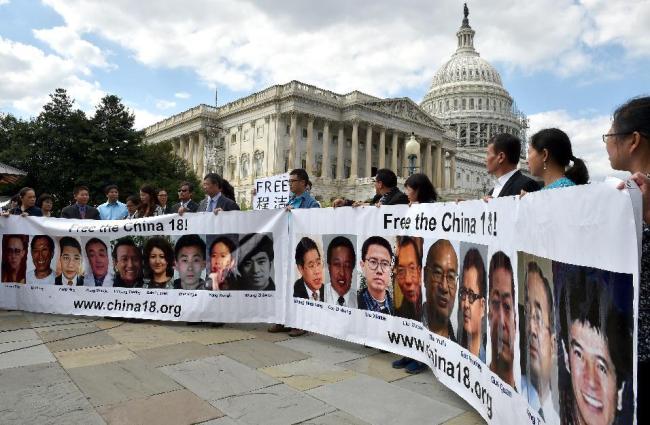Daughters of Chinese activists demand meeting with Obama
By Korea HeraldPublished : Sept. 18, 2014 - 20:40
WASHINGTON (AFP) ― Daughters of detained Chinese activists on Wednesday demanded a meeting with President Barack Obama, saying he must double down on efforts to win their release when he meets Chinese leaders.
Gathered on Washington’s sun-kissed Capitol lawn alongside Congressional allies, the women insisted the United States can and must do more to get their dads out of jail.
“I believe that high-level diplomacy is our fathers’ only chance for freedom,” said Ti-Anna Wang, daughter of Wang Bingzhang, founder of the China Spring movement, who got a life sentence in 2003 after a closed trial that lasted just a day.
Their release, Wang said, must be discussed when Obama travels to Beijing in November for the Asia-Pacific Economic Cooperation summit.
Gathered on Washington’s sun-kissed Capitol lawn alongside Congressional allies, the women insisted the United States can and must do more to get their dads out of jail.
“I believe that high-level diplomacy is our fathers’ only chance for freedom,” said Ti-Anna Wang, daughter of Wang Bingzhang, founder of the China Spring movement, who got a life sentence in 2003 after a closed trial that lasted just a day.
Their release, Wang said, must be discussed when Obama travels to Beijing in November for the Asia-Pacific Economic Cooperation summit.

But before he goes, the president ― himself a father of two daughters ― ought to personally lend an ear to the worried and angry offspring, she added.
Joining Wang were the daughters of rights advocates Gao Zhisheng, Zhang Shaojie, Chang Boyang and Liu Xianbin, plus friends of detained Tibetan activists Tenzin Delek Rinpoche and Lobsang Tsering.
Gao, a lawyer who defended some of China’s most vulnerable people such as underground Christians, aggrieved miners and members of the banned Falungong spiritual movement, spent years in windowless solitary confinement before he was released in August, only to find himself in virtual house arrest.
“My dad’s tragic hardship has not ended,” said Grace Geng Ge, who said he suffers from poor health and gets intrusive two-hour visits twice a day from public security forces.
Also speaking Wednesday was Chen Guangcheng, the blind anti-corruption lawyer who reached the United States in 2012 after escaping house arrest in Shandong province.
“Freedom for China actually is in the real long-term interest of America. I hope American statesmen can really realize that,” said Chen through an interpreter.
Speaking at the East-West Center in Hawaii last month, U.S. Secretary of State John Kerry said the United States would continue to promote human rights and democracy in Asia “without arrogance, but also without apology.”
Congressman Chris Smith, co-chair of the Congressional-Executive Committee on China, said “private and deferential diplomacy” had failed to produce results.
“We urge the administration to take up a new approach,” said Smith, a Republican from New Jersey, as he introduced the daughters.
-
Articles by Korea Herald







![[Graphic News] More Koreans say they plan long-distance trips this year](http://res.heraldm.com/phpwas/restmb_idxmake.php?idx=644&simg=/content/image/2024/04/17/20240417050828_0.gif&u=)
![[KH Explains] Hyundai's full hybrid edge to pay off amid slow transition to pure EVs](http://res.heraldm.com/phpwas/restmb_idxmake.php?idx=644&simg=/content/image/2024/04/18/20240418050645_0.jpg&u=20240419100350)






![[From the Scene] Monks, Buddhists hail return of remains of Buddhas](http://res.heraldm.com/phpwas/restmb_idxmake.php?idx=652&simg=/content/image/2024/04/19/20240419050617_0.jpg&u=20240419175937)

![[KH Explains] Hyundai's full hybrid edge to pay off amid slow transition to pure EVs](http://res.heraldm.com/phpwas/restmb_idxmake.php?idx=652&simg=/content/image/2024/04/18/20240418050645_0.jpg&u=20240419100350)

![[Today’s K-pop] Illit drops debut single remix](http://res.heraldm.com/phpwas/restmb_idxmake.php?idx=642&simg=/content/image/2024/04/19/20240419050612_0.jpg&u=)